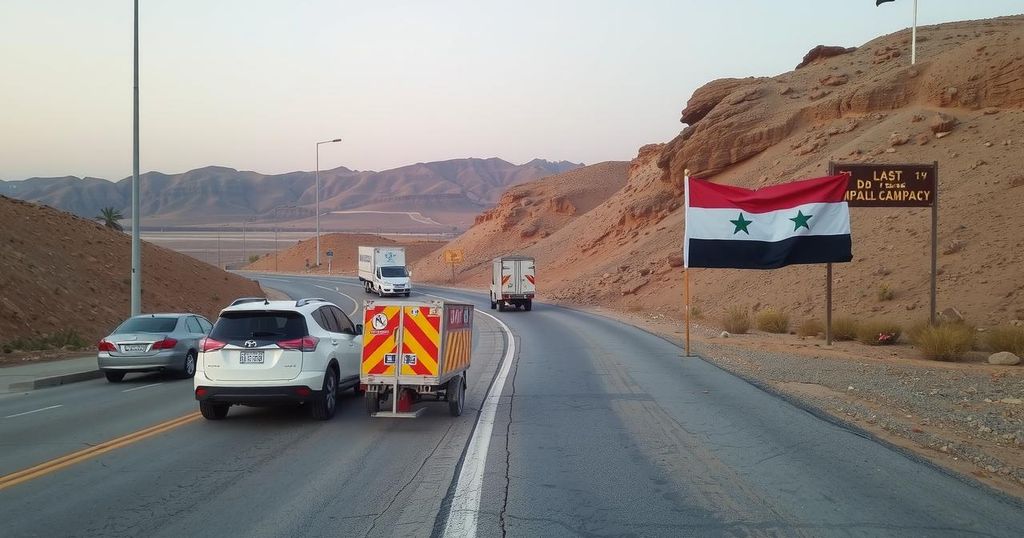Global news
ABU MOHAMMED AL - GOLANI, AFRICA, AL - QAEDA, ASIA, ASSAD, BASHA, BASHAR ASSAD, CIVILIAN CASUALTIES, CONFLICT, GHANA, HEZBOLLAH, HO, HOMS, KURDISH, LEBANON, MA, MIDDLE EAST AFFAIRS, MILITARY OPERATIONS, NORTH AMERICA, RASTAN, REUTERS, SUNNI MUSLIM, SYRIA, UNITED STATES
Jamal Walker
0 Comments
Mass Exodus from Homs as Militants Advance Amid Syrian Conflict
The city of Homs in Syria is experiencing a mass exodus as militant forces led by Hayat Tahrir Al-Sham (HTS) press southward against government troops. Abu Mohammed Al-Golani, head of HTS, confirmed intentions to return refugees and build Syria amid their recent territorial advances. Reports also indicate increased movement by the radical Daesh group, presenting further challenges for the Assad regime, which is already strained by external factors.
In recent days, the city of Homs in Syria has witnessed a mass exodus of residents fleeing amid escalating conflict as militant forces, led by Hayat Tahrir Al-Sham (HTS), push southward against government troops. The head of HTS, Abu Mohammed Al-Golani, in his first interview since the offensive began, expressed intentions to “build Syria” and facilitate the return of Syrian refugees currently residing in Lebanon and Europe. The rapid territorial gains experienced by HTS since November 27 have shifted the dynamics of the longstanding civil war, previously dominated by President Bashar Assad’s forces with the support of allies such as Russia and Iran.
Reports indicate that militants have successfully captured the towns of Talbisa and Rastan, bringing them close to Homs, a strategic location linking Damascus to Assad’s coastal territories, which are vital strongholds for his regime. The Syrian Observatory for Human Rights announced that thousands are fleeing from Homs, seeking refuge in coastal areas amid fears that the insurgents will seize the city.
The situation has worsened for Assad, as intelligence indicates the re-emergence of the radical Daesh group in eastern Syria, with increased movement of combatants reported in the Deir Ezzor desert region. This resurgence poses yet another challenge to Assad’s grip on the region.
With the recent revitalization of HTS efforts, the role of Hezbollah has also come into focus. The Lebanese militia, which has provided support to Assad, mobilized some forces to Homs in an attempt to curb the militant advance. However, both Russia and Hezbollah have been stretched by other conflicts, giving HTS an opportunity to exploit the situation in Syria’s increasingly volatile landscape.
Golani, during his interview, suggested that HTS could “dissolve at any time,” asserting that their current campaign was not an end in itself but rather aimed at confronting Assad’s regime and furthering their long-term objectives.
The ongoing Syrian civil war, which began more than a decade ago, has seen the rise and fall of various factions. After initially losing control of large areas, President Bashar Assad has regained most of Syria, aided by military support from Russia and Iranian-backed forces. The conflict took another turn with the resurgence of the HTS group, which evolved from an Al-Qaeda affiliate and is currently making significant territorial advances. The instability created by the war has led to millions of Syrians fleeing their homes, creating one of the largest refugee crises worldwide. As external influences, like Russia’s focus on Ukraine, shift, the insurgents see new opportunities for offensive action against Assad’s regime, which increasingly faces challenges from both militants and resurgent terrorist groups.
In conclusion, the situation in Syria continues to evolve rapidly as HTS gains ground against President Assad’s forces, prompting fears among the civilian population in Homs and surrounding areas. With the potential for further instability due to the threat from Daesh and the diminishing control of Assad’s allies, the implications for the region are dire. The aspirations expressed by HTS to repatriate refugees add another layer of complexity to an already intricate conflict, raising concerns about the future governance of the areas they aim to control.
Original Source: www.arabnews.com




Post Comment